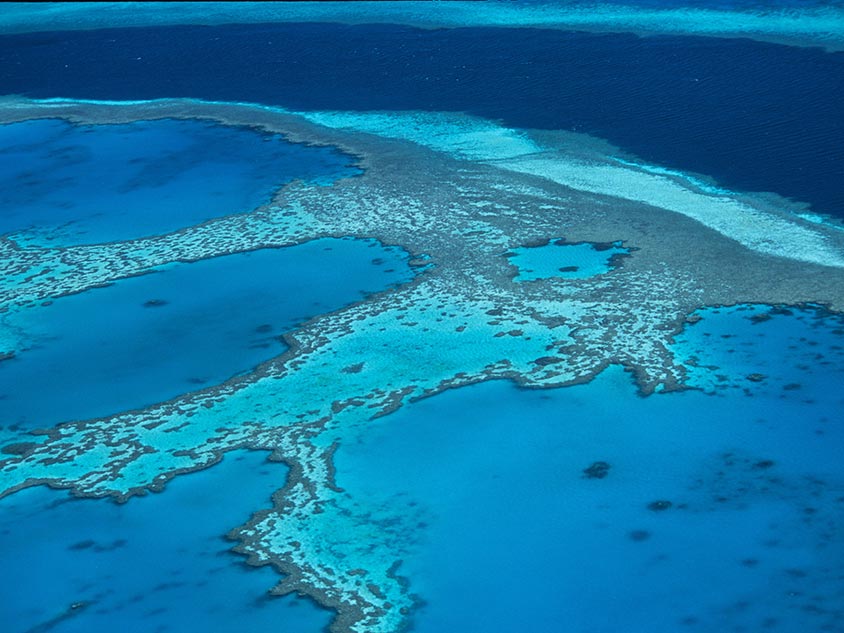
Photographer: W. Stewart, Copyright: Commonwealth of Australia (GBRMPA)
Researchers are looking to harness the Great Barrier Reef’s massive size, to help it resist and recover from the impacts of climate change – such as coral bleaching and increasingly frequent and severe weather events.
Drawing on leading experts from across the country, the Reef Restoration and Adaptation Program aims to create a suite of innovative and targeted measures that can be applied at the scale needed to help the Reef withstand the escalating threats it faces.
Many of the researchers involved in the program are presenting at the international Great Barrier Reef Restoration Symposium in Cairns this week.
Program director, and Australian Institute of Marine Science executive, David Mead said forecast modelling showed that in addition to climate-change mitigation and existing reef management activities, additional measures would be needed to help the Reef.
“Even with strong action to reduce climate change, water temperatures will continue to rise and stabilise at levels that are currently very stressful for corals,” he said.
“There are already some very promising reef restoration methods used around the world. The big challenge is being able to feasibly scale these up to make a difference to billions of corals spread over thousands of square kilometres.
“But rather than being a barrier, we believe the Reef’s massive nature can actually be an asset if we can harness its connectivity and natural variability.”
Mr Mead said the techniques being scoped included land-based aquaculture facilities to produce corals to supplement reefs if needed.
“Damaged reefs could be repaired with larvae from these aquaculture facilities, or from collecting and moving coral spawn slicks – which occur naturally during the annual spawning event,” he said.
“Other stress reduction measures we are investigating include increasing shade through marine cloud-seeding, and the use of an ultra-thin surface film on high-risk reefs at times where bleaching damage is predicted to occur.”
The program’s $6M scoping phase, funded by the Australian Government, also includes extensive consultation with industry, community, and the broader Australian public, to gauge sentiment, appetite for intervention and priorities for action if, when, and where it is decided action is needed.
“While we are examining some very promising methods, none will be a perfect solution, or risk-free, so it is critical that we understand the will and priorities of the Australian people,” Mr Mead said.
The outcome would be a plan presented to Government at the end of the year, identifying and prioritising research and development projects which could begin from as early as 2019.
Australian Institute of Marine Science senior research scientist, Dr Line Bay, who leads research into corals’ stress tolerance and adaptability, said several approaches were delivering promising results in the laboratory.
“There are many different ways we can harness corals’ natural ability to withstand stress to help them better cope with increasing temperatures,” she said.
“These include identifying naturally tolerant corals on the reef – such as bleaching survivors on warm northern reefs, and facilitate their spread to cooler but warming southern reefs.”
Dr Bay said both modelling and breeding experiments indicated these approaches could have net positive effects for the Reef and would be reported for the first time at the conference.
“Exploring novel reef restoration tools must not detract from addressing the root causes of Reef decline – principally climate change,” she said.
“But we should not delay this research while we still have time and options. The aim is to deliver a range of trialled and tested tools for the Reef that can be used if needed, but only if research can demonstrate that they are safe, effective and affordable.”
The Great Barrier Reef Restoration Symposium is a collaboration between the Tropical Water Quality Hub (TWQ) of the Australian Government’s National Environmental Science Program (NESP) and the Reef Restoration and Adaptation Program (RRAP), with funding support from the Association of Marine Park Tourism Operators (AMPTO) and the Reef and Rainforest Research Centre (RRRC).
For a program and further information: www.GBRrestorationsymposium.org
Media inquiries: Danielle Koopman, Reef Restoration and Adaptation Program: 0402 968 131
d.koopman@aims.gov.au Twitter: @DanKoop1